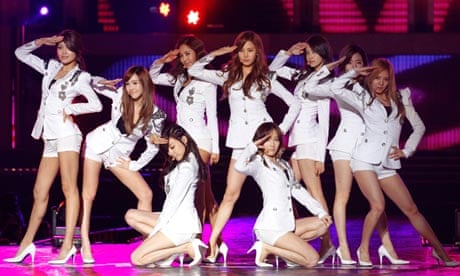Japan's wildly popular annual TV singing contest will not feature a single Korean pop act when millions tune in on New Year's Eve, in an apparent snub over territorial frictions with South Korea.
The Red and White Song Battle, one of the most keenly anticipated TV programmes of the year, will instead feature an all-Japanese lineup that includes the popular girl group AKB48, their sister act SKE48, and the veteran crooners Smap.
But there was no room among the 50 acts announced this week for the K-pop sensation Girls' Generation, who have sold millions of albums in Japan and won praise for their support for the 11 March tsunami victims.
The nine-member group, who will reportedly release their first album recorded entirely in English next year, made their debut in last year's contest, joining fellow Korean artists Kara and Tohoshinki.
NHK, which has broadcast the show for more than 60 years, said politics was not behind the decision to drop Korean performers. "It has nothing to do with the souring of relations between Japan and Korea," the show's manager, Taro Furutani, told reporters. "Korean singers were dropped after reviewing how popular they were over 2012, and after looking at support for them among Japanese fans."
An NHK statement was more ambiguous, saying Korean acts had not been chosen "considering public opinion and their activities this year".
Longstanding tensions over rival claims to a pair of islands, known as Takeshima in Japan and Dokdo in South Korea, were reignited in August when Lee Myung-bak became the first sitting president to visit the territory.
Amid furious protests from Japan, the dispute began to seep into the country's cultural ties. A Japanese foreign ministry official said the popular actor Song Il Gook would no longer be welcome in Japan after he took part in a swimming relay between the Korean mainland and Dokdo, while nationalists held small demonstrations in Shin-Okubo, a Tokyo neighbourhood at the centre of the Korean pop culture boom in Japan.
Members of Girls' Generation drew criticism in Japan for having previously voiced support for Seoul's claims over the islands. Despite signs that K-pop's popularity has waned this year, the group's current single, Flower Power, was No 4 on Oricon's daily chart on Monday, according to McClureMusic.com.
The snub could be bad news for Korean management agencies with groups such as Girls' Generation on their books: they have built their financial success largely on the back of sales in Japan, whose music market is 15 times bigger than South Korea's.
Several Korean acts have made the NHK lineup in recent years, and the show has traditionally featured other Asian singers and a handful from the US, including Paul Simon in 1990.
The contest, which is essential viewing for millions of families on 31 December, runs for more than four hours and ends minutes before Japan rings in the New Year.
